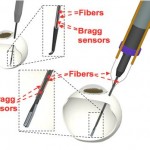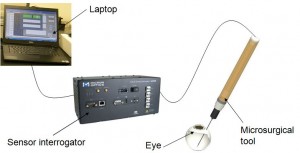Sep 30 2011
Delicate Medical Procedures Improved with FBG Sensors
There are many reasons that engineers and scientists select Fiber Bragg Grating (FBG) sensors for their applications. Here’s a case where the FBG’s small size and need for ultra-high sensitivity were the drivers.
Researchers at Johns Hopkins University are working to help surgeons find tools to make delicate eye surgery more safe and effective. Employing robots in these procedures would help translate relatively coarse human motion into much more stable, controlled and fine machine motion. But to make this feasible, the surgeon must have tactile feedback, that is, a sense of touch that would be translated back through the mechanism.
So this is where the FBG sensors play a key role. FBGs are embedded in to a 0.5mm (25 gauge) diameter instrument so that when it contacts a delicate membrane in the eye, the surgeon would feel the direction and magnitude of the contact. The Micron Optics sm130-700, sampling at 2kHz, measures the FBG’s and is integrated into the feedback and control loop.
 Images courtesy of Russ Taylor/Iulian Iordachita
Images courtesy of Russ Taylor/Iulian Iordachita
This work is detailed nicely in this paper “A sub-millimetric, 0.25 mN resolution fully integrated fiber-optic force-sensing tool for retinal microsurgery“. You can also find information at the website of the JHU Laboratory for Computational Sensing + Robotics and at the CISST website (scroll down and click on Article on Russ Taylor and surgical robotics).
For more information, contact Iulian Iordachita at iordachita@jhu.edu
Comments Off
